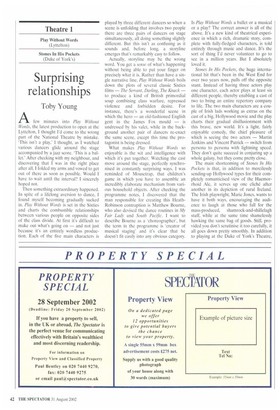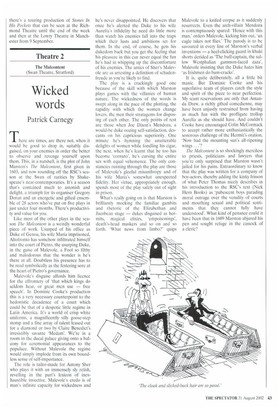Surprising relationships
Toby Young
Afew minutes into Play Without Words, the latest production to open at the Lyttelton, I thought I'd come to the wrong part of the National Theatre by mistake. This isn't a play,' I thought, as I watched various dancers glide around the stage accompanied by a jazz score. This is a ballet.' After checking with my neighbour, and discovering that I was in the right place after all. I folded my arms and vowed to get out of there as soon as possible. Would I have to wait until the interval? I sincerely hoped not.
Then something extraordinary happened. In spite of a lifelong aversion to dance, I found myself becoming gradually sucked in. Play Without Words is set in the Sixties and charts the combustible relationships between various people on opposite sides of the class divide. At first it's difficult to make out what's going on — and not just because it's an entirely wordless production. Each of the five main characters is played by three different dancers so when a scene is unfolding that involves two people there are three pairs of dancers on stage simultaneously, all doing something slightly different. But this isn't as confusing as it sounds and, before long, a stotyline emerges that's remarkably easy to follow.
Actually, storyline may be the wrong word. You get a sense of what's happening without being able to put your finger on precisely what it is. Rather than have a single narrative line, Play Without Words boils down the plots of several classic Sixties films — The Servant, Darling, The Knack — to produce a kind of British primordial soup combining class warfare, repressed violence and forbidden desire. For instance, there's a wonderful scene in which the hero — an old-fashioned English gent in the James Fox mould — is undressed by his valet, while in the background another pair of dancers re-enact the same scene, except this time the protagonist is being dressed.
What makes Play Without Words so enjoyable is the wit and intelligence with which it's put together. Watching the cast move around the stage, perfectly synchronised in constantly surprising ways. I was reminded of Mousetrap, that children's game in which you have to assemble an incredibly elaborate mechanism from various household objects. After checking the programme notes, I discovered that the man responsible for creating this HeathRobinson contraption is Matthew Bourne, who also devised the dance routines in My Fair Lady and South Pacific. I want to describe Bourne as a 'choreographer', but the term in the programme is 'creator of musical staging' and it's clear that he doesn't fit easily into any obvious category. Is Play Without Words a ballet or a musical or a play? The correct answer is all of the above. It's a new kind of theatrical experience in which a rich, dramatic story. complete with fully-fledged characters, is told entirely through music and dance. It's the sort of thing I'd never volunteer to go to see in a million years. But I absolutely loved it.
Stones In His Pockets, the huge international hit that's been in the West End for over two years now, pulls off the opposite stunt. Instead of having three actors play one character, each actor plays at least six different people, thereby enabling a cast of two to bring an entire repertory company to life. The two main characters are a couple of Irish lads working as extras on the cast of a big, Hollywood movie and the play charts their gradual disillusionment with this brave, new world. It's a light, fairly enjoyable comedy, the chief pleasure of which is seeing the two actors — Martin Jenkins and Vincent Patrick — switch from persona to persona with lightning speed. They don't quite succeed in conjuring up a whole galaxy, but they come pretty close.
The main shortcoming of Stones In His Pockets is that, in addition to mercilessly sending-up Hollywood types for their completely romanticised view of the Haemorrhoid Ale, it serves up one cliché after another in its depiction of rural Ireland. The Irish playwright, Marie Jones, wants to have it both ways, encouraging the audience to laugh at those who fall for the mass-produced, shamrock-and-shillelagh stuff, while at the same time shamelessly hawking the same bag of goods. Still, provided you don't scrutinise it too carefully, it all goes down pretty smoothly. In addition to playing at the Duke of York's Theatre, there's a touring production of Stones In His Pockets that can be seen at the Richmond Theatre until the end of the week and then at the Lowry Theatre in Manchester from 9 September.



























































 Previous page
Previous page